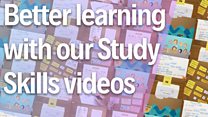Unit 10: Go The Distance: Succeeding in exams
Select a unit
- 1 Go The Distance: Choosing distance learning
- 2 Go The Distance: Academic reading
- 3 Go The Distance: Academic talk
- 4 Go The Distance: Academic writing
- 5 Go The Distance: Finding and using source material
- 6 Go The Distance: Going the distance
- 7 Go The Distance: Critical thinking
- 8 Go The Distance: Social learning
- 9 Go The Distance: Projects
- 10 Go The Distance: Succeeding in exams
Session 3
Study Skills 10 – Revising for exams
Welcome back to Study Skills – the series that brings you tips and tools to help you succeed in distance learning. This time we take a look at a key activity for any distance learner: revising for exams!
Activity 1
Get yourself exam ready!
It's exam time! Are you ready? Scroll down to watch the video and get our exam tips!
Exams: The moment of truth
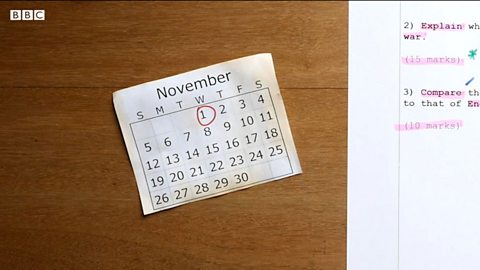
It's finally time. Your exam is about to begin, and you're feeling the pressure. Actually, you're not feeling bad at all. Why? Because you've been revising like a pro. Watch the video to get yourself exam ready!
To do
While you watch, see if you can spot FOUR pieces of advice about using past exam papers to help you revise. Write them down if you like and you can check your answers – in an activity – later on this page.
Watch the video

Narrator
It's finally time. Your exam is about to begin, and you're feeling the pressure. Actually, you're not feeling bad at all. Why? Because you've been revising like a pro.
You didn't even need to cram. Instead you looked at old exam papers: to learn what kind of questions come up, to get an idea of the possible topics, to learn the marks available, and how long for each question. Looking at specimen answers also helped. And best of all you did this early in the term, not one week before the exam.
What else? You made a plan. And you even stuck to it, well done. And you used a range of techniques just right for you. Here are a few ideas. Go on, pause the video and look them up.
You also looked after yourself. You ate well, slept well and even did fun things between studying, helping you bust stress. Even if you did procrastinate a little. I said: "a little".
Ahh, and here we are again. The moment of truth. Just make sure you revise the right subject. Good luck!
Four ways to use old exam papers
4 Questions
Did you spot the tips about four ways to use old exam papers when you're revising? Check you've understood with this activity.
Help
Activity
Did you spot the tips about four ways to use old exam papers when you're revising? Check you've understood with this activity.
Hint
You can get an idea of the kinds of questions that are likely to come up in an examQuestion 1 of 4
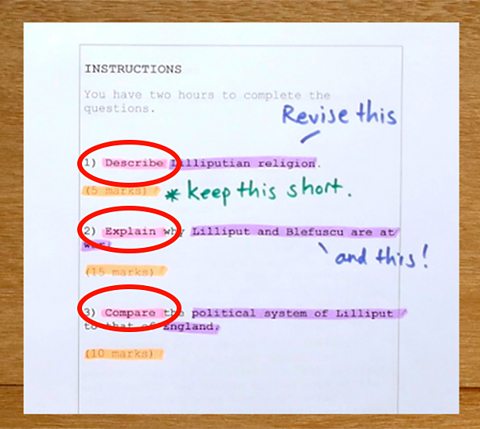
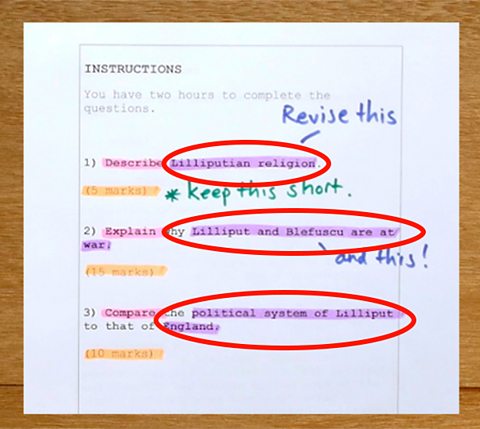
Help
Activity
Did you spot the tips about four ways to use old exam papers when you're revising? Check you've understood with this activity.
Hint
You can get an idea of the possible topics that you may be questioned aboutQuestion 2 of 4

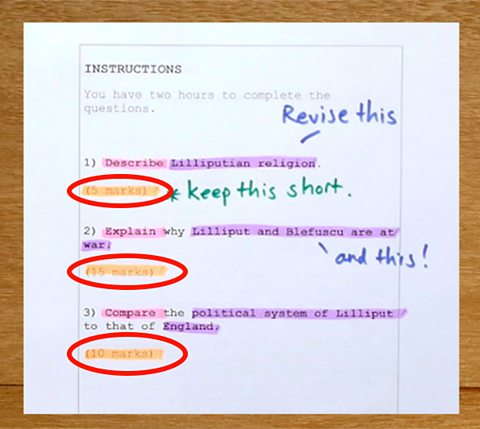
Help
Activity
Did you spot the tips about four ways to use old exam papers when you're revising? Check you've understood with this activity.
Hint
You can find out about how many marks are available for each questionQuestion 3 of 4


Help
Activity
Did you spot the tips about four ways to use old exam papers when you're revising? Check you've understood with this activity.
Hint
Information about the marks available for each question can also give you an idea about time managementQuestion 4 of 4


Excellent! Great job! Bad luck! You scored:
Nine tips for an excellent exam experience
If you want to give yourself the best chance of exam success, you need to be well prepared. Let's recap the nine things we've learned about revising for exams as a distance learner.
- Don't cram! Make sure you're well prepared for your exams to avoid having to do lots of work at the last minute!
- Don't throw old exam papers away! You can use them to get an idea of the questions and possible topics that may appear in your exams.
- Exam papers often tell you the marks available for each question – you can work out how much to write and how much time to spend on your answers.
- Make sure you prepare early – start looking at exam papers and revising early in the term, not one week before the exam!
- Make a study plan – and try to stick to it!
- Try using a range of techniques to help you revise – you're more likely to remember things for your exams if you use a variety of study methods.
- Look after yourself! Eat well and get plenty of sleep to stay healthy as you revise – and don't forget to take regular breaks!
- Do fun things to help break up the time between your study sessions – but don't procrastinate too much!
- When the moment of truth arrives on the day of your exam, don't panic! Take a deep breath and do your best. Good luck!
Find out more
For more information on Study Skills, scroll down and click on the links in the 'Where next?' section.
Where next?
Session Vocabulary
Find out more about distance learning – visit our partner,The OU
____________________
To help you understand the tips in this Study Skills video, here are some key words and their definitions:
to cram
to study intensively just before an examspecimen
typical exampleto procrastinate
to delay doing something, usually because it's boringthe moment of truth
an important occasion that tests someone and affects their future

